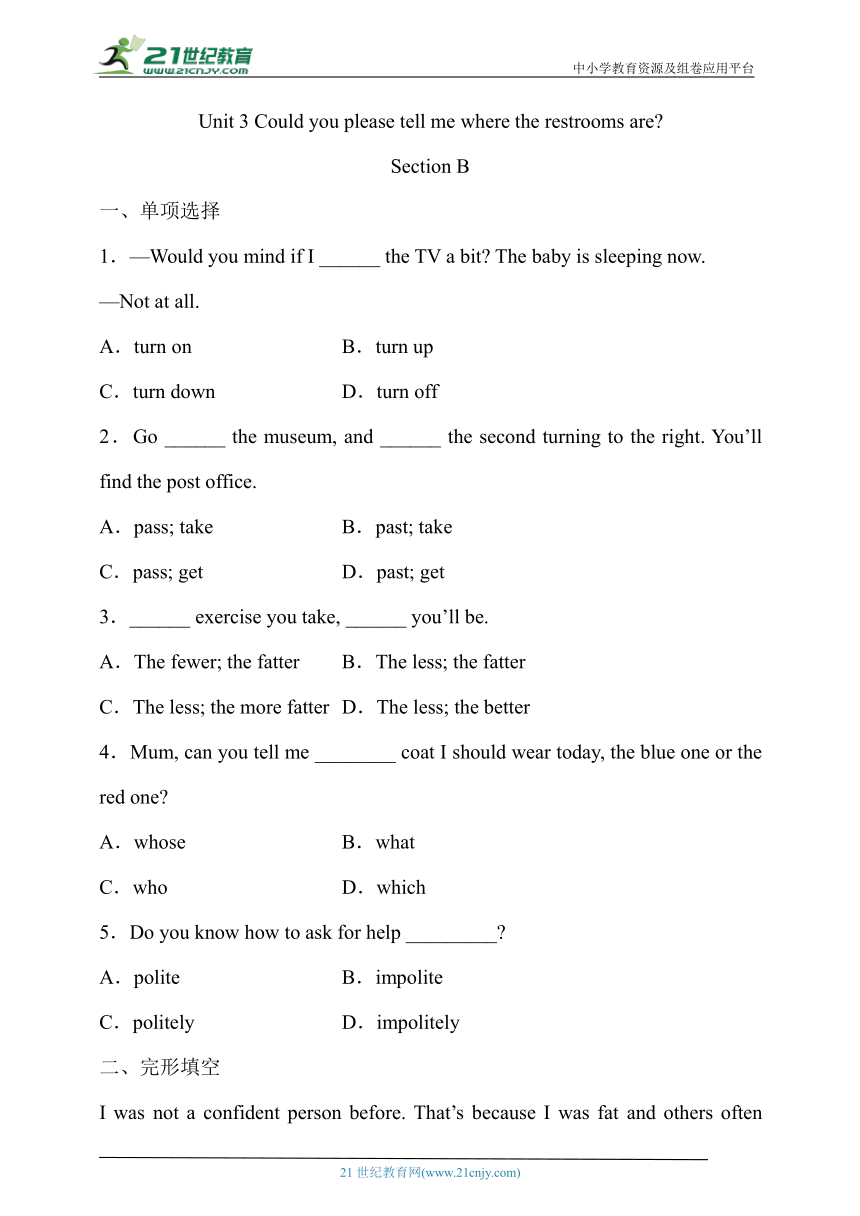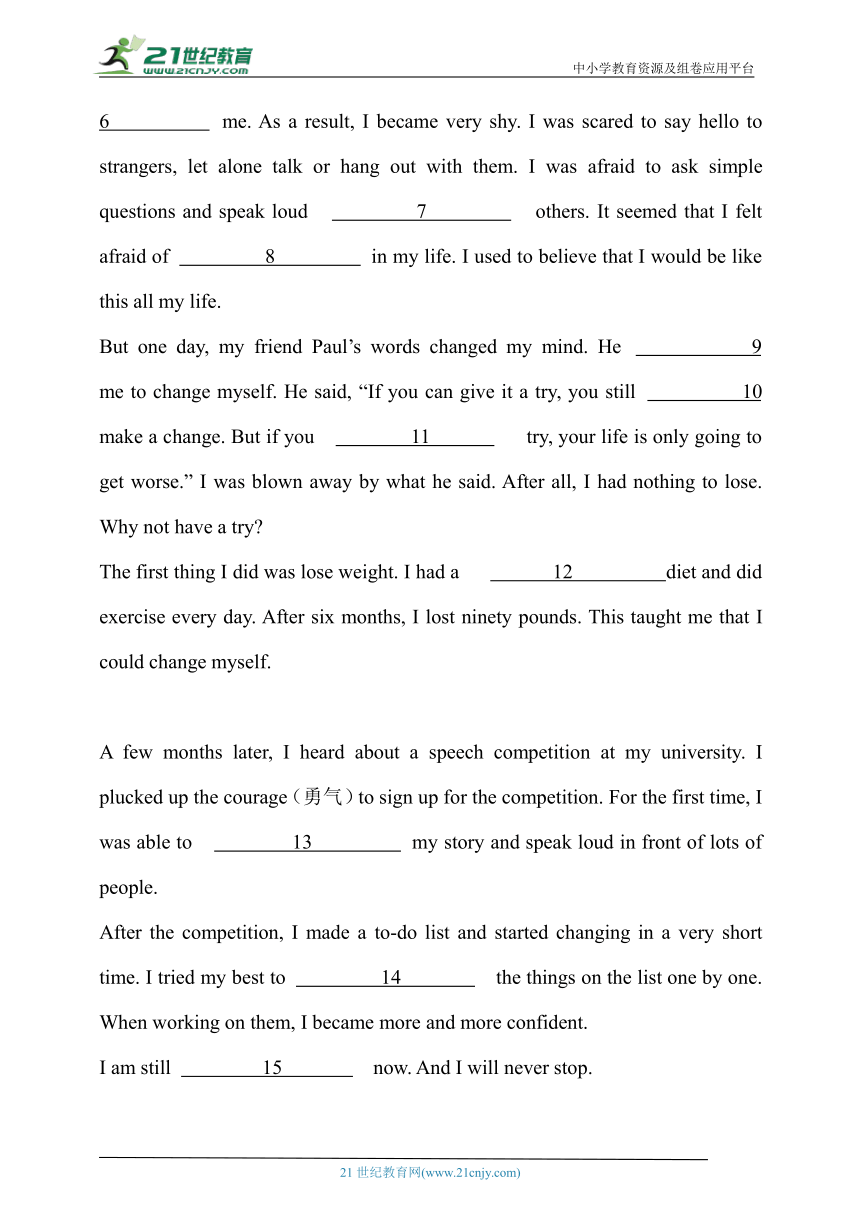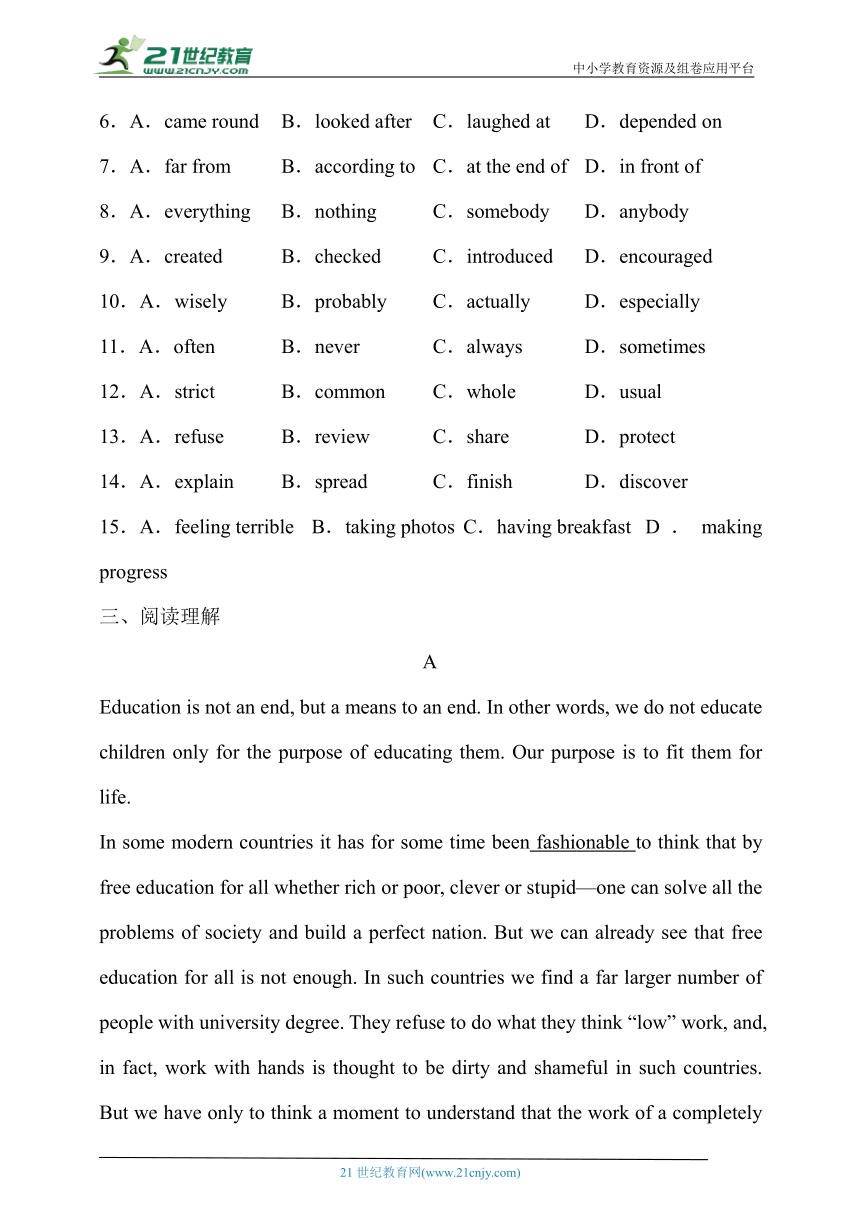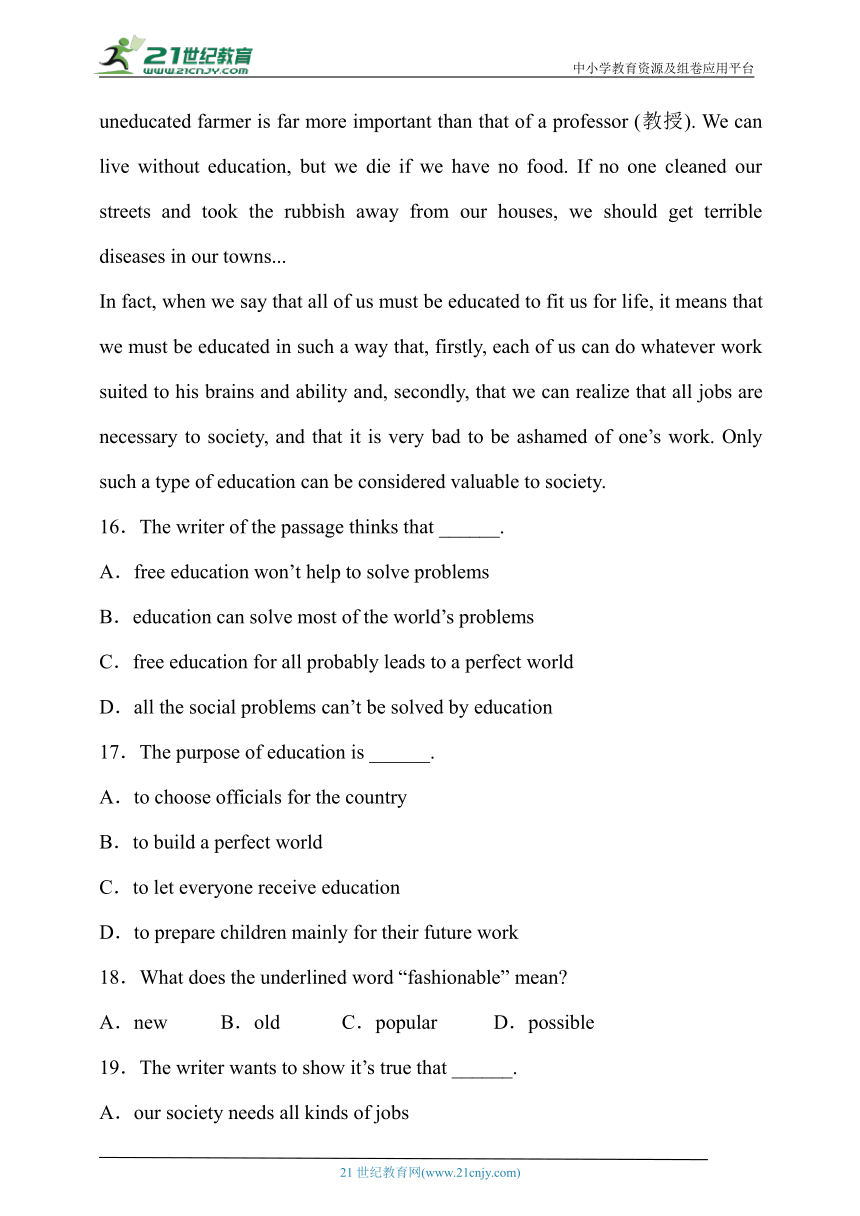Unit 3 Could you please tell me where the restrooms are Section B 同步练习(含答案)
文档属性
| 名称 | Unit 3 Could you please tell me where the restrooms are Section B 同步练习(含答案) |

|
|
| 格式 | docx | ||
| 文件大小 | 46.1KB | ||
| 资源类型 | 教案 | ||
| 版本资源 | 人教新目标(Go for it)版 | ||
| 科目 | 英语 | ||
| 更新时间 | 2024-09-26 16:17:26 | ||
图片预览




文档简介
中小学教育资源及组卷应用平台
Unit 3 Could you please tell me where the restrooms are
Section B
一、单项选择
1.—Would you mind if I ______ the TV a bit The baby is sleeping now.
—Not at all.
turn on B.turn up
C.turn down D.turn off
2.Go ______ the museum, and ______ the second turning to the right. You’ll find the post office.
A.pass; take B.past; take
C.pass; get D.past; get
3.______ exercise you take, ______ you’ll be.
A.The fewer; the fatter B.The less; the fatter
C.The less; the more fatter D.The less; the better
4.Mum, can you tell me ________ coat I should wear today, the blue one or the red one
A.whose B.what
C.who D.which
5.Do you know how to ask for help _________
A.polite B.impolite
C.politely D.impolitely
二、完形填空
I was not a confident person before. That’s because I was fat and others often 6 me. As a result, I became very shy. I was scared to say hello to strangers, let alone talk or hang out with them. I was afraid to ask simple questions and speak loud 7 others. It seemed that I felt afraid of 8 in my life. I used to believe that I would be like this all my life.
But one day, my friend Paul’s words changed my mind. He 9 me to change myself. He said, “If you can give it a try, you still 10 make a change. But if you 11 try, your life is only going to get worse.” I was blown away by what he said. After all, I had nothing to lose. Why not have a try
The first thing I did was lose weight. I had a 12 diet and did exercise every day. After six months, I lost ninety pounds. This taught me that I could change myself.
A few months later, I heard about a speech competition at my university. I plucked up the courage(勇气)to sign up for the competition. For the first time, I was able to 13 my story and speak loud in front of lots of people.
After the competition, I made a to-do list and started changing in a very short time. I tried my best to 14 the things on the list one by one. When working on them, I became more and more confident.
I am still 15 now. And I will never stop.
6.A.came round B.looked after C.laughed at D.depended on
7.A.far from B.according to C.at the end of D.in front of
8.A.everything B.nothing C.somebody D.anybody
9.A.created B.checked C.introduced D.encouraged
10.A.wisely B.probably C.actually D.especially
11.A.often B.never C.always D.sometimes
12.A.strict B.common C.whole D.usual
13.A.refuse B.review C.share D.protect
14.A.explain B.spread C.finish D.discover
15.A.feeling terrible B.taking photos C.having breakfast D.making progress
三、阅读理解
A
Education is not an end, but a means to an end. In other words, we do not educate children only for the purpose of educating them. Our purpose is to fit them for life.
In some modern countries it has for some time been fashionable to think that by free education for all whether rich or poor, clever or stupid—one can solve all the problems of society and build a perfect nation. But we can already see that free education for all is not enough. In such countries we find a far larger number of people with university degree. They refuse to do what they think “low” work, and, in fact, work with hands is thought to be dirty and shameful in such countries. But we have only to think a moment to understand that the work of a completely uneducated farmer is far more important than that of a professor (教授). We can live without education, but we die if we have no food. If no one cleaned our streets and took the rubbish away from our houses, we should get terrible diseases in our towns...
In fact, when we say that all of us must be educated to fit us for life, it means that we must be educated in such a way that, firstly, each of us can do whatever work suited to his brains and ability and, secondly, that we can realize that all jobs are necessary to society, and that it is very bad to be ashamed of one’s work. Only such a type of education can be considered valuable to society.
16.The writer of the passage thinks that ______.
A.free education won’t help to solve problems
B.education can solve most of the world’s problems
C.free education for all probably leads to a perfect world
D.all the social problems can’t be solved by education
17.The purpose of education is ______.
A.to choose officials for the country
B.to build a perfect world
C.to let everyone receive education
D.to prepare children mainly for their future work
18.What does the underlined word “fashionable” mean
A.new B.old C.popular D.possible
19.The writer wants to show it’s true that ______.
A.our society needs all kinds of jobs
B.our society needs free education for all
C.a farmer is more important than a professor
D.work with hands is the most important
20.The passage tells us about ______ of the education.
A.the means B.the system C.the value D.the type
B
We all know that the British people love their manners (礼仪). They are part of their national identity (特性), as well as having fish and chips and complaining about the weather. Recently I read online that they say “sorry” up to eight times a day.
After some research I have not been able to find any specific reasons why they are like this. I suppose, for centuries, manners, including how they behave at table and talk to other people have been one of the differences between the lower and upper classes and those manners show their social classes. Britain has traditionally been a quite conservative (保守的) country. There are many articles suggesting that their seemingly polite attitude of always saying “please” and “thank you” is quite false because it is impossible for a person to always feel that he or she wants to thank someone or say “please”.
Maybe it is for this reason that people are going one of two ways: they are too polite and hold back their feelings or they are not polite at all and express their true feelings directly. Some British people are tired of pretending that they are always happy and having to please others. But sometimes because they feel they have to be polite, they are prevented from saying what they truly think.
21.What don’t the British people often do
A.Eating fish and chips.
B.Having no good manners.
C.Being polite to others.
D.Talking about the weather.
22.The British people say “_________” up to eight times every day.
A.hello B.thank you C.I don’t know D.sorry
23.According to the passage, why are the British people so polite
① The upper classes should have good manners.
② They have learned much about politeness at school.
③ They like to hold back their true feelings.
④ They are not honest at all.
A.①② B.③④ C.①③ D.②④
24.What does the underlined word “pretending” in Paragraph 3 mean
A.Planing. B.Acting. C.Imagining. D.Tasting.
25.Which can be the best title for this passage
A.Why British People Are So Polite
B.British People Should Not Be So Polite
C.How to Learn the British Manners
D.It’s Time to Change Our Manners
四、单词拼写
根据句意及首字母或汉语提示完成单词
26.There is a supermarket near my house. It’s very c_________ for me to shop.
27.I don’t know where Mr. Smith lives. Can you tell me his a________
28.There is a basketball in the __________(角落)of the room.
29.Their English __________(课程)are fantastic.
30.He drove his car in the __________(方向)of Beijing.
用括号内所给单词的适当形式填空
31.Jack finds it difficult to pronounce some English words __________(correct).
32.It’s __________(polite)to laugh at others.
33.There were not many people in the supermarket, so it was __________(crowded).
34.To __________(who)did you give the book
35.These reporters are English __________(speak).
【答案】
一、1-5 CBBDC
二、6-15 CDADB BACCD
三、16-20 DDCAC 21-25 BDCBA
四、26.convenient 27.address 28.corner 29.course 30.direction
31.correctly 32.impolite 33.uncrowded 34.whom 35.speakers
21世纪教育网 www.21cnjy.com 精品试卷·第 2 页 (共 2 页)
21世纪教育网(www.21cnjy.com)
Unit 3 Could you please tell me where the restrooms are
Section B
一、单项选择
1.—Would you mind if I ______ the TV a bit The baby is sleeping now.
—Not at all.
turn on B.turn up
C.turn down D.turn off
2.Go ______ the museum, and ______ the second turning to the right. You’ll find the post office.
A.pass; take B.past; take
C.pass; get D.past; get
3.______ exercise you take, ______ you’ll be.
A.The fewer; the fatter B.The less; the fatter
C.The less; the more fatter D.The less; the better
4.Mum, can you tell me ________ coat I should wear today, the blue one or the red one
A.whose B.what
C.who D.which
5.Do you know how to ask for help _________
A.polite B.impolite
C.politely D.impolitely
二、完形填空
I was not a confident person before. That’s because I was fat and others often 6 me. As a result, I became very shy. I was scared to say hello to strangers, let alone talk or hang out with them. I was afraid to ask simple questions and speak loud 7 others. It seemed that I felt afraid of 8 in my life. I used to believe that I would be like this all my life.
But one day, my friend Paul’s words changed my mind. He 9 me to change myself. He said, “If you can give it a try, you still 10 make a change. But if you 11 try, your life is only going to get worse.” I was blown away by what he said. After all, I had nothing to lose. Why not have a try
The first thing I did was lose weight. I had a 12 diet and did exercise every day. After six months, I lost ninety pounds. This taught me that I could change myself.
A few months later, I heard about a speech competition at my university. I plucked up the courage(勇气)to sign up for the competition. For the first time, I was able to 13 my story and speak loud in front of lots of people.
After the competition, I made a to-do list and started changing in a very short time. I tried my best to 14 the things on the list one by one. When working on them, I became more and more confident.
I am still 15 now. And I will never stop.
6.A.came round B.looked after C.laughed at D.depended on
7.A.far from B.according to C.at the end of D.in front of
8.A.everything B.nothing C.somebody D.anybody
9.A.created B.checked C.introduced D.encouraged
10.A.wisely B.probably C.actually D.especially
11.A.often B.never C.always D.sometimes
12.A.strict B.common C.whole D.usual
13.A.refuse B.review C.share D.protect
14.A.explain B.spread C.finish D.discover
15.A.feeling terrible B.taking photos C.having breakfast D.making progress
三、阅读理解
A
Education is not an end, but a means to an end. In other words, we do not educate children only for the purpose of educating them. Our purpose is to fit them for life.
In some modern countries it has for some time been fashionable to think that by free education for all whether rich or poor, clever or stupid—one can solve all the problems of society and build a perfect nation. But we can already see that free education for all is not enough. In such countries we find a far larger number of people with university degree. They refuse to do what they think “low” work, and, in fact, work with hands is thought to be dirty and shameful in such countries. But we have only to think a moment to understand that the work of a completely uneducated farmer is far more important than that of a professor (教授). We can live without education, but we die if we have no food. If no one cleaned our streets and took the rubbish away from our houses, we should get terrible diseases in our towns...
In fact, when we say that all of us must be educated to fit us for life, it means that we must be educated in such a way that, firstly, each of us can do whatever work suited to his brains and ability and, secondly, that we can realize that all jobs are necessary to society, and that it is very bad to be ashamed of one’s work. Only such a type of education can be considered valuable to society.
16.The writer of the passage thinks that ______.
A.free education won’t help to solve problems
B.education can solve most of the world’s problems
C.free education for all probably leads to a perfect world
D.all the social problems can’t be solved by education
17.The purpose of education is ______.
A.to choose officials for the country
B.to build a perfect world
C.to let everyone receive education
D.to prepare children mainly for their future work
18.What does the underlined word “fashionable” mean
A.new B.old C.popular D.possible
19.The writer wants to show it’s true that ______.
A.our society needs all kinds of jobs
B.our society needs free education for all
C.a farmer is more important than a professor
D.work with hands is the most important
20.The passage tells us about ______ of the education.
A.the means B.the system C.the value D.the type
B
We all know that the British people love their manners (礼仪). They are part of their national identity (特性), as well as having fish and chips and complaining about the weather. Recently I read online that they say “sorry” up to eight times a day.
After some research I have not been able to find any specific reasons why they are like this. I suppose, for centuries, manners, including how they behave at table and talk to other people have been one of the differences between the lower and upper classes and those manners show their social classes. Britain has traditionally been a quite conservative (保守的) country. There are many articles suggesting that their seemingly polite attitude of always saying “please” and “thank you” is quite false because it is impossible for a person to always feel that he or she wants to thank someone or say “please”.
Maybe it is for this reason that people are going one of two ways: they are too polite and hold back their feelings or they are not polite at all and express their true feelings directly. Some British people are tired of pretending that they are always happy and having to please others. But sometimes because they feel they have to be polite, they are prevented from saying what they truly think.
21.What don’t the British people often do
A.Eating fish and chips.
B.Having no good manners.
C.Being polite to others.
D.Talking about the weather.
22.The British people say “_________” up to eight times every day.
A.hello B.thank you C.I don’t know D.sorry
23.According to the passage, why are the British people so polite
① The upper classes should have good manners.
② They have learned much about politeness at school.
③ They like to hold back their true feelings.
④ They are not honest at all.
A.①② B.③④ C.①③ D.②④
24.What does the underlined word “pretending” in Paragraph 3 mean
A.Planing. B.Acting. C.Imagining. D.Tasting.
25.Which can be the best title for this passage
A.Why British People Are So Polite
B.British People Should Not Be So Polite
C.How to Learn the British Manners
D.It’s Time to Change Our Manners
四、单词拼写
根据句意及首字母或汉语提示完成单词
26.There is a supermarket near my house. It’s very c_________ for me to shop.
27.I don’t know where Mr. Smith lives. Can you tell me his a________
28.There is a basketball in the __________(角落)of the room.
29.Their English __________(课程)are fantastic.
30.He drove his car in the __________(方向)of Beijing.
用括号内所给单词的适当形式填空
31.Jack finds it difficult to pronounce some English words __________(correct).
32.It’s __________(polite)to laugh at others.
33.There were not many people in the supermarket, so it was __________(crowded).
34.To __________(who)did you give the book
35.These reporters are English __________(speak).
【答案】
一、1-5 CBBDC
二、6-15 CDADB BACCD
三、16-20 DDCAC 21-25 BDCBA
四、26.convenient 27.address 28.corner 29.course 30.direction
31.correctly 32.impolite 33.uncrowded 34.whom 35.speakers
21世纪教育网 www.21cnjy.com 精品试卷·第 2 页 (共 2 页)
21世纪教育网(www.21cnjy.com)
同课章节目录
- Unit 1 How can we become good learners.
- Section A
- Section B
- Unit 2 I think that mooncakes are delicious!
- Section A
- Section B
- Unit 3 Could you please tell me where the restroom
- Section A
- Section B
- Unit 4 I used to be afraid of the dark.
- Section A
- Section B
- Unit 5 What are the shirts made of?
- Section A
- Section B
- Review of Units 1-5
- Unit 6 When was it invented?
- Section A
- Section B
- Unit 7 Teenagers should be allowed to choose their
- Section A
- Section B
- Unit 8 It must belong to Carla.
- Section A
- Section B
- Unit 9 I like music that I can dance to.
- Section A
- Section B
- Unit 10 You're supposed to shake hands.
- Section A
- Section B
- Review of Units 6-10
- Unit 11 Sad movies make me cry.
- Section A
- Section B
- Unit 12 Life is full of the unexpected
- Section A
- Section B
- Unit 13 We're trying to save the earth!
- Section A
- Section B
- Unit 14 I remember meeting all of you in Grade 7.
- Section A
- Section B
- Review of Units 11-14
